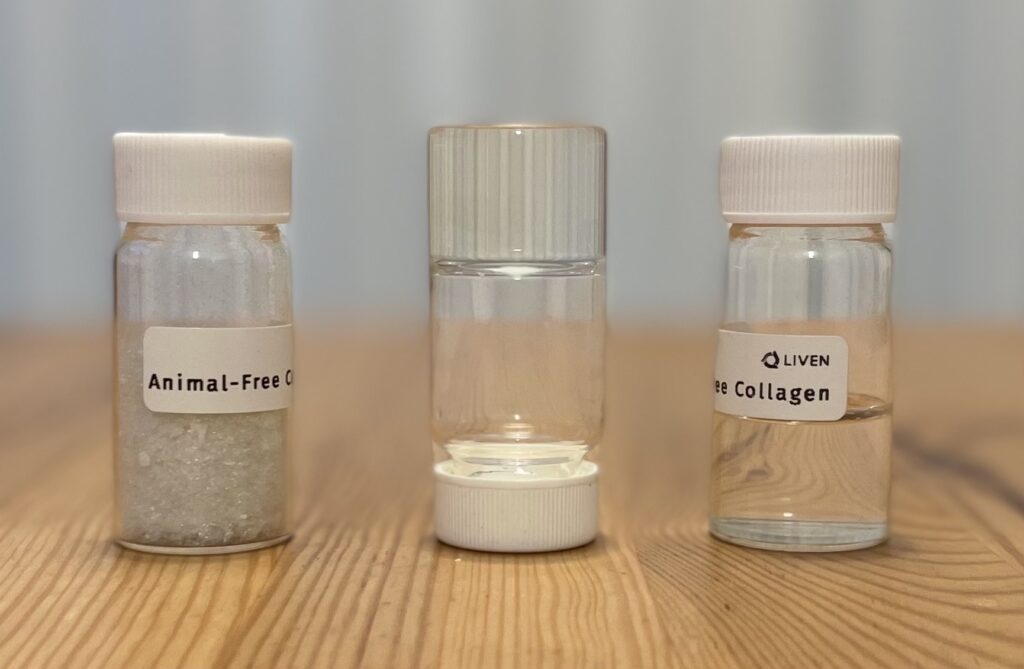L’Oréal Launches Animal-Free Collagen Skincare in China, As Recombinant Technology Gains Steam
6 Mins Read
With leading beauty conglomerates announcing new beauty lines featuring recombinant collagen, the potential for China to be a leader in the synthetic biotechnology ingredient industry.
In December 2023, the leading international beauty brand, L’Oréal launched the second generation of its Age Perfect Collagen Royal Anti-Aging Face Cream, tailored exclusively for the discerning Chinese market. This groundbreaking release marked a pivotal moment for L’Oréal Paris skincare as it introduced the pioneering inclusion of recombinant collagen into its product line for the very first time, and also marks an important step in the commercialization of the recombinant collagen industry. The recombinant collagen incorporated into this formulation is said to feature an amino acid sequence that claims 100% homology to type III collagen found in human skin. Its touted unique triple-helix flexible bending structure purportedly allows this collagen variant to seamlessly interact with the skin’s natural collagen, potentially stimulating collagen production at its core.
L’Oréal’s launch of this product seems to underscore their commitment to capitalizing on scientific advancements and biotech innovations in skin care. More importantly, the entry of international brand L’Oréal has made China’s hot recombinant protein market even more topical.
What is collagen?
There are at least 28 identified types of collagen, classified according to homology and biological function, each characterized by distinct structures and varying prevalence in the animal body. Collagen is crucial for various functions, including skin elasticity, joint flexibility, hair and nail well-being, and overall tissue health. Its versatility is evident in skin care, where collagen is a common ingredient, potentially imparting anti-ageing effects and promoting smoother, resilient skin. The pharmaceutical field utilizes collagen in medical treatments, wound healing, and regenerative medicine due to its biocompatibility and bioactive properties. Collagen’s influence extends beyond healthcare into the food industry, where it plays a role in dietary supplements, functional foods, and beverages. This multifaceted protein serves as a cornerstone in addressing diverse health and cosmetic needs, highlighting its significance across healthcare, skincare, and nutrition. Moreover, in the culinary world, collagen is used as a gelling agent and thickener, particularly in broths and gelatinous desserts.
Collagen can be manufactured through two primary methods: natural extraction and synthetic biotechnology. In the natural extraction process, collagen is derived from animal sources like cattle, pigs, and marine animals. Typically, collagen is extracted from specific animal parts, such as the skin, bones, or scales. On the other hand, synthetic biotechnology employs genetically engineered microorganisms, such as bacteria and yeast, to express collagen. The resulting product, known as recombinant collagen, undergoes fermentation and downstream purification processes.
The ascent of recombinant collagen has captured significant attention, driven by its advanced biotechnological approach that ensures precise control over collagen characteristics and the production of high-purity products. Noteworthy advantages encompass enhanced safety features, such as heightened hydrophilicity, reduced immune rejection, and robust processability, addressing concerns linked to animal-derived collagen. Its positive environmental impact is evident in the elimination of the need for animal husbandry and fishing practices, thereby contributing to marine biodiversity conservation and improved animal welfare. This innovation also eliminates the requirement for cold chain transportation, facilitating easy storage and offering a more sustainable alternative. As fermentation preparation scales up, the economic viability of recombinant collagen increases.
Despite these advantages, challenges persist in the commercialization process, focusing on the expression of the triple helix structure, gene fragment selection, triple helix structure construction, and overcoming obstacles in cell transfection and protein purification. While recombinant collagen is still in its early commercialization stage, the current emphasis is on scaling up production and reducing costs to facilitate broader adoption.

The history of recombinant collagen in China
Research into recombinant collagen in China has a substantial history. In the 2000s, a research team initiated the exploration of synthetic biology technology for developing recombinant collagen. This effort eventually culminated in the establishment of the first publicly listed company in this domain, Xi’an Giant Biogene. Notably, in 2014, Nanjing University of Science and Technology collaborated with Jiangsu Jland Biotech to jointly undertake the “Key technologies for high-density fermentation of genetically engineered bacteria to express collagen, efficient separation processes, and their Industrialization” project as part of the China National High-tech Research and Development Program, commonly known as the 863 Program. This initiative has since led to the incubation of numerous research and commercialization projects in the field.
The start of 2024 brings optimistic developments to the industry. Jiangsu Trautec, a recombinant collagen company backed by Japanese beauty brand Shiseido and French luxury brand LVMH, initiated the process of registering for listing guidance with the Jiangsu Securities Regulatory Bureau on January 8. This marks a promising start for the sector. As of today, it is estimated that more than 30 companies are actively developing and commercializing recombinant collagen pipelines in China. Jiangsu Trautec, Jiangsu Jland Biotech, Shanxi Jinbo Biopharmaceuticals (a supplier of recombinant collagen ingredients to L’Oréal), and Xi’an Giant Biogene currently stand at the forefront of the industry.

Recombinant collagen: the economic opportunity
According to research by Frost & Sullivan, the retail sales for China’s animal-derived collagen and recombinant collagen markets in 2021 are projected to be 17.9 billion yuan (2.77 billion USD) and 10.8 billion yuan (1.67 billion USD), respectively. The CAGRs from 2017 to 2021 of animal-derived collagen and recombinant collagen markets stand at 21.8% and 63.0%, respectively. The collagen market is anticipated to sustain a robust growth trajectory in the coming years. By 2027, the overall size of China’s collagen product market is estimated to reach 173.8 billion yuan (24.42 billion USD), exhibiting a CAGR of 34.3%. Within this, the CAGR for recombinant collagen is forecasted to be 42.4%, surpassing that for collagen derived from animal sources at 25.3%. The expected increase in the penetration rate of recombinant collagen from 37.7% in 2021 to 62.3% in 2027 is noteworthy, indicating a substantial market shift. Consequently, the market size for recombinant collagen is predicted to reach 108.3 billion yuan (15.22 billion USD).

The recombinant collagen startup landscape
For example, Liven Proteins is a Canada-based company focused on the production of animal-free collagen ingredients for China and the global market. Liven uniquely plays in the food and nutrition sector, particularly focusing on functional foods, beverages, and nutraceuticals to support healthy ageing. In comparison with collagen for skin, hair and nails, collagen ingredients for health benefits, such as Type II collagen for joint health, are premium ingredients with 10-100x price compared with commodity collagen. Odourless and completely soluble, Liven’s ingredients also offer adaptability for creating consumer-friendly products that meet the increasing demand for health-conscious choices.
Other recognizable international players in the field of recombinant collagen encompass Avantor, ProColl, Merck, ACROBiosystems, Geltor, and Jellatech. Still, with the fast development and commercialization in China, it will be difficult for China to be left behind, not only for collagen but in all coming applications in the recombinant protein space. As of today, there are numerous examples of Chinese companies’ successful commercialization of fermentation products and holding leading positions in the subsectors, such as hyaluronic acid, amino acids, and erythritol.
The development of the recombinant collagen market in China for skincare applications is indicative of the increasing power of synthetic biology to replace traditional animal-based sources. The application of recombinant collagen in the medical and cosmetics industries is just the beginning. We expect that with the development of technology and the expansion of production scale, recombinant collagen will soon be applied in other areas with lower cost structures, such as nutraceuticals, functional foods and beverages, and even bulk raw materials for food production.
This post was authored by Rouyu Wu, Director of Investment and Innovation at Dao Foods. For a more in-depth view of China’s developments in fermentation and new proteins, download The New Protein Adoption in China Report.




